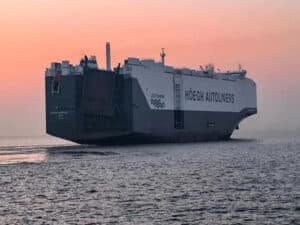
The shipping industry officially supports a carbon price. What now?
Written by Marine Log Staff
Tyler McFadden
by Tyler McFadden
Federal Policy Manager for Climate
Pacific Environment
The International Chamber of Shipping (ICS) last month told the Financial Times it has ended its years-long opposition to carbon pricing.
ICS, along with the other major industry groups, is now encouraging world leaders to urgently discuss the role of carbon pricing in helping to accelerate the shipping industry’s transition off fossil fuels, at an International Maritime Organization (IMO) meeting this June (“MEPC76”).
As environmental advocates, we welcome this announcement. But ICS must do more than virtue signal. We argue that as a concrete first step ICS should now withdraw its “International Maritime Research Board” (IMRB) proposal to the IMO for a $2/tonne tax on bunker fuel sales, because this inadequate policy would achieve too little, while using up IMO’s precious time for discussion. If ICS now agree we need to prioritize the discussion on carbon pricing, in practical terms they must stop delaying this with alternatives.
Why? Because the climate emergency is here. Our climate has already warmed to 1.2°C above pre-industrial levels, causing global climate-induced catastrophes and eroding our natural world. 20% of the world’s coral reefs have died since 2015 and we’re on track to lose nearly 90% of all coral reefs by 2100. Twenty-two climate-related disasters cost the United States $100 billion in 2020. Our people, our wildlife, and oceans are dying.
In this context, ICS’s IMRB proposal to facilitate more discussion, research, and review of alternative fuels via a research and development fund is not good enough. Their proposal will not support the magnitude of investment needed to catalyze the upgrade to zero-carbon international shipping. It will not incentivize any behaviour change in how ships are operated, or which fuels are used. What it will do is take up the vast majority of negotiating time available at the IMO’s next environmental meeting, effectively preventing serious negotiation on carbon pricing.
The Marshall Islands and Solomon Islands – one the 3rd largest Flag State, and both extremely climate-vulnerable nations – have put forward a robust, comprehensive carbon pricing proposal for the shipping industry. It includes a research and development function akin to the IMRB concept, except more ambitious. The essence of the proposal is a $100 levy per metric ton of carbon emissions from all merchant ships. This would immediately help the shipping industry narrow the price gap between fossil and non-fossil fuels, raise the scale of funds needed to build out zero-carbon fuels infrastructure, and help those countries most directly harmed by shipping’s climate impact to adapt.
Economists have made the case for carbon fees for decades. Due to the entrenched and subsidized nature of the fossil fuel industry in our economy, dirty and polluting heavy fuel oil, and fossil gas, remain artificially cheap. To incentivize governments and operators to pursue zero-emission vessels, we need to move subsidies away from fossil fuels and onto zero-carbon fuels.
A $100 levy per metric ton carbon proposed by the Marshall Islands and the Solomon Islands is the necessarily ambitious proposal. Money talks. Establishing financial consequences for pollution will help future-proof the shipping industry, protect our port communities, and create certainty around the business case for green shipping. To accomplish this, the ICS must withdraw its IMRB proposal, and throw its weight behind supporting the $100/metric ton proposal as quickly as possible.
The international shipping industry has polluted our oceans and air for decades because of shipping’s reliance on heavy fuel oil and other fossil fuels to power ship engines. The industry is one of the world’s largest polluters, contributing to 6 million cases of childhood asthma and around 250,000 premature deaths a year – even after the 2020 sulphur cap. In the face of a worsening climate crisis, the shipping industry is responsible for 1 billion tonnes of carbon dioxide emissions a year, and that number is climbing.
The time for talking is over. We must act now to safeguard the future of the shipping industry itself, in a world where investors, lenders, and the public are losing patience with polluters.




